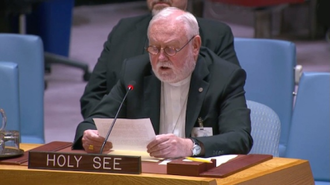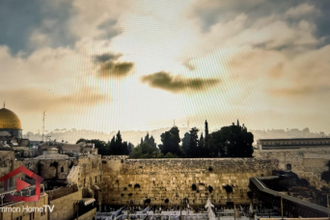Holy See urges moratorium on autonomous weapons at UN debate on AI

Archbishop Gallagher addresses UN
Source: Holy See Mission, Vatican Media
Addressing the UN Security Council, Archbishop Paul Richard Gallagher called for a moratorium on lethal autonomous weapons and highlights the need for a human-centered approach to artificial intelligence.
The need for urgent measures to ensure that the rapid development of artificial intelligence (AI) remains anchored in respect for human dignity and directed to the common good was at the heart of Archbishop Paul Richard Gallagher's speech at the UN Security Council during a debate on Artificial Intelligence and International Peace and Security.
Speaking on Wednesday, the Vatican Secretary for Relations with States and International Organisations, warned that while AI carries the potential to advance peace, development and human rights, it also poses serious risks when detached from ethical considerations.
"The digital revolution, particularly in the field of AI, is having a deep impact on areas such as education, employment, art, healthcare, governance, the military, and communication," Archbishop Gallagher said. He noted that these innovations can contribute to realising the very aspirations that inspired the founding of the United Nations 80 years ago.
At the same time, he cautioned, "if the development and use of AI are not firmly anchored in respect for human dignity and the pursuit of the common good, they risk becoming instruments of division and aggression, with the potential to fuel further conflict."
Call for a moratorium on Lethal Autonomous Weapons
Among the most pressing concerns raised was the deployment of lethal autonomous weapon systems (LAWS), which the Archbishop described as raising "grave legal, security, humanitarian, and ethical concerns for the international community, because they lack the unique human capacity for moral judgment and ethical decision-making."
For this reason, he affirmed, "the Holy See strongly supports the adoption of an immediate moratorium on the development or use of LAWS, as well as a legally binding instrument to ensure that decisions over life and death remain under meaningful human control."
Risks of an AI-driven arms race
Archbishop Gallagher also pointed to the dangers of an emerging arms race involving the integration of AI into military systems, including space assets and missile defence systems. Such trends, he said, risk "altering the nature of weapons and warfare, creating an unprecedented level of uncertainty, due to the possibility of miscalculation."
Particularly troubling, he warned, is the prospect of AI being incorporated into nuclear command and control structures. "This introduces new unknown risks that extend far beyond the already fragile and morally troubling logic of nuclear deterrence," he said.
A human-centred Approach
Thus, the Holy See representative urged the Security Council to assume its responsibility to monitor scientific and technological progress closely, ensuring that peace and security debates take into account both opportunities and dangers.
"In order to address these pressing issues, the Holy See calls for a human-centred approach to the development and use of emerging technologies," he said.
"It should also recognise that certain applications, such as technology that replaces human judgment in matters of life and death, cross inviolable boundaries that must never be breached."
Concluding his intervention, Archbishop Gallagher reminded delegates that international cooperation is essential to prevent AI from becoming a driver of division or destruction. Instead, he said, it must be oriented towards the service of humanity, peace, and justice.
The full text of Archbishop Gallagher's address follows:
Mesdames Co-Presidents,
The Holy See would like to express its gratitude to the Philippines and Sweden for their work as Article XIV Coordinators and to thank the Executive Secretary of the CTBTO, Mr. Robert Floyd, for his dedication to the noble goals of this Organization.
When the Holy See signed the CTBT on 24 September 1996, it emphasized that "in the sphere of nuclear weapons, the banning of tests and of the further development of these weapons, disarmament and non-proliferation are closely linked and must be achieved as quickly as possible under effective international controls".[1] The Holy See would like to stress once again that the entry into force of the CTBT remains an urgent and necessary step to avoid nuclear catastrophe.
For nearly three decades, the Treaty has been a fundamental component of the non-proliferation and disarmament regimes. However, it remains a regrettable reality that the Treaty has not yet entered into force. This situation undermines global efforts against nuclear testing. In this respect, questions also arise regarding ethical responsibility.
In today's international context where human dignity and international law are all too often undermined, the Holy See reiterates its appeal to the remaining Annex II States that have not yet ratified the CTBT to take the necessary steps in order to ratify this Treaty.
The Holy See's consistent position is that peace cannot be secured through mutual fear or the logic of deterrence. History has shown that even nuclear tests can have catastrophic humanitarian and environmental consequences, which are not limited to the affected area. Regrettably, the continuous expansion and modernization of nuclear arsenals, accompanied by increasingly belligerent rhetoric and threats concerning their deployment, perpetuate the dangerous illusion that security can be achieved through the threat of annihilation. As Pope Leo XIV stated when commemorating the 80th anniversary of the bombing of Hiroshima and Nagasaki: "Despite the passing of the years, those tragic events constitute a universal warning against the devastation caused by wars and, in particular, by nuclear weapons. I hope that in the contemporary world, marked by strong tensions and bloody conflicts, the illusory security based on the threat of mutual destruction may give way to the tools of justice, to the practice of dialogue, and to trust in fraternity."[2]
Mesdames Co-Presidents,
The CTBT is more than just a technical treaty. It symbolizes humanity's capacity and will to choose dialogue over destruction, reason over rivalry, and solidarity over suspicion. Let us not allow this moment to pass without reaffirming our commitment to a future in which no Nation, leader, or generation ever considers the testing or use of nuclear weapons to be an option.
As stated by the Holy See during the ratification of the Treaty on 18 July 2001: "In lending moral support to the CTBT through this solemn act of ratification, the Holy See encourages the whole International Community, which is aware of the various challenges standing in the way of nuclear disarmament, to intensify its efforts to ensure the implementation of the said Treaty."[3]
The Holy See stands ready to collaborate with all States and peoples of goodwill to promote a vision that is rooted in the common good of the entire human family. Each State and the International Community must strive to work together in order to strengthen efforts towards stability and true, lasting peace.
Thank you, Mesdames Co-Presidents.


















